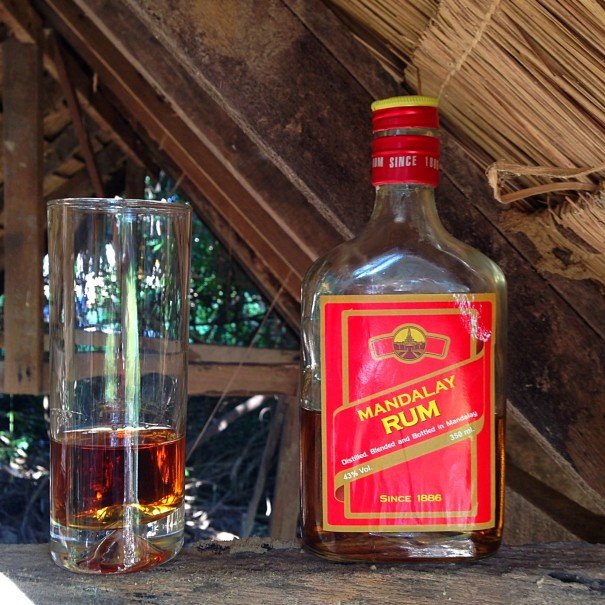
Here’s to Better Rum and the End of War

Here’s to Better Rum and the End of War
Mandalay Rum in Bhamo
On an evening in November, as night fell on Yangon, I set out from a dark bar with a paper cup full of rum. The tea shops and beer stations were coming alive, and my taxi cleared the outskirts of the city, taking a right on the road leading to Sule Pagoda, which was alight from afar. Teens were taking selfies as fountain jets sprayed over Maha Bandula Garden and there was something special in the air, an undeniable thrill. After five decades of being misgoverned by dictatorial military generals, the Burmese masses exerted their will and, a few days before my arrival, elected the democratic opposition to a landslide victory over the military.
Yangon radiated renaissance and it felt as though life in Myanmar had never been this full of possibility. The downtown streets were filled with the pioneers of Myanmar’s new democracy: everyone from chinlone kickers and beetle spitters to punk rockers and KTV singers to student activists and teenage dreamers flaunted their hopes and grand ambitions down Friday-evening boulevards. It was a great time to be drinking local rum in the back of a taxi, coasting through the city.
The rum required its own kind of honesty, and Mandalay Rum—the country’s oldest distilled liquor—was almost too sunny on its edges. The molasses taste was lashed with dark sugar and candied citrus, but adding a little lime juice and a soupçon of honey, as the Burmese were wont to do, made for a fitting drink to get me from place to place.
The place I arrived at was a cocktail lounge in a colonial heritage building, where I met some old friends who told stories of the days when I once lived in Yangon. When it was time to order drinks, I looked at the menu with great interest; but Mandalay Rum, which sells for around a dollar per bottle on the street, wasn’t one of the choice liquors at the expat-inclined lounge. I ordered a Negroni and remembered how I had heard that rum was the drink of the Burmese countryside, enjoyed against palms, water, jungles, and pagodas in the sky. It seemed unlikely that I would be sharing a bottle of Mandalay in Yangon that night, and before long the citywide 11 p.m. curfew shut down the bars.
A few days later I went to the countryside, heading up north to the country’s Kachin state where a putative civil war between the Burmese military’s Tatmadaw Army and the regional Kachin Independence Army was ongoing. I settled in Bhamo, a relative safe zone amid the conflict, and one of the northernmost cities on the Irrawaddy River. For a town with less than ten main streets, Bhamo had no shortage of beer stations with bottles of rum on hand.
They say rum is a stalwart of the Burmese workingman, and after laboring on the warm river jetties all day, fishmongers and stevedores started arriving to beer stations on their motorbikes, seeking out shots of rum. Shots at roadside beer stations cost anywhere from a dime to a half-dollar, and as I drank at a station called Sein Sein, men would stop by the bar, take a shot of Mandalay, and hop back on their motos to find their way home. As the aging jetty workers came and went, younger residents of Bhamo hung around the tables nursing beers and smiling into their smart phones. For the youthful drinkers of the countryside, rum dating back to 1886 failed to adequately express these changing times.
I drank at Sein Sein while the sun came down and the hills turned pink. Then I walked along the river to Shinbo Jetty and thought of the many reasons Myanmar remained so strangely alluring: bullets flew thirty minutes north of me, bombs were falling in Shan state, the center-left was replacing the militaristic right, and the young Burmese were decked out in gingham and Aviators, mixing seamlessly with the ever-modernizing social scene. In short, Myanmar had become a hip amalgamation of war, democracy, and parties. The hope, of course, is that there won’t always be war, and that the parties and democracy—and even the rum—will get better with the endless tang of the passage of time.